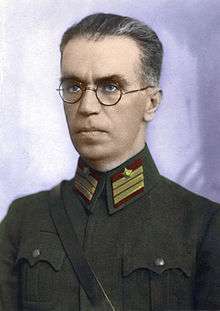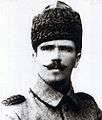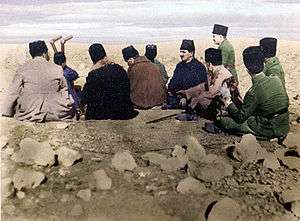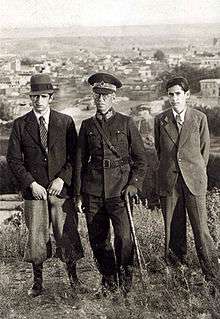Hayrullah Fişek
General Hayrullah Fişek (1885–1975) was a career officer in the Turkish army (Captain, Ottoman War Academy, 1904 - rtd. 1945, Major-General (Mirliva)[1] Undersecretary for the Ministry of National Defence).
Hayrullah Fişek | |
|---|---|
 Mirliva Hayrullah Pasha (11 November 1932) | |
| Turkish Army | |
| Undersecretary for the Ministry of National Defence | |
| Personal details | |
| Born | 3 June 1885 Kalkandelen, Ottoman Empire (currently Tetovo, Macedonia) |
| Died | 13 July 1975 (aged 90) Ankara, Turkey |
| Nationality | Ottoman, Turkish |
| Awards | Turkish Medal of Independence Medjidie |
| Military service | |
| Allegiance | Ottoman Empire, Turkey |
| Rank | Major general |
| Battles/wars | First Balkan War Second Balkan War World War I Caucasus Campaign Battle of Sakarya |
Life
Hayrullah Fişek, born in Kalkandelen (now Tetovo, North Macedonia), was a senior officer in the Turkish army. Hayrullah was given the name Fişek, meaning cartridge in Turkish. Hayrullah Fişek was a direct descendant of Süleyman Aga "Fişekçi" (born around 1775 in Kalkandelen), the founder of the Fişek family.
His parents were Hafiz Süleyman Efendi (1849 Kalkandelen – 1894 Balıkesir), a Land Registry Officer and Fatma Hanko (1847 Kalkandelen –1930 Istanbul), Sheikh Mustafa Ruhi Efendi's daughter.[2] He was of Albanian descent.
Military career
He entered Military Academy in 1901. He completed the Military Academy as the seventh of the class in 1904 (1320-P.7) and joined the Ottoman military as an Infantry Second Lieutenant (Mülazım-ı Sani). In 1906, he entered the Staff College and he graduated as a Distinguished Captain (Mümtaz Yüzbaşı).[3]
During the Turkish Independence War, he participated in the Battle of Sakarya as the chief of staff of the Provisional Corps (Mürettep Kolordu)[4] and he served as the chief of staff of XIV Corps, Kocaeli Group, III Corps with the rank of staff lieutenant colonel.[5] He also participated in battle at Balıkesir, Soma and Bandırma. He retired in 1946.[6]
Family
He had one sister named Hatice (1873–1902) and 3 brothers : Abdülhâmit Bey (1866–1917), a Finance officer, Nuri Bey (1878–1945), and Zekeriya Bey (1880–1932), both officers of the Turkish Army.
Hayrullah married his wife Mukaddes Fişek (1891–1958) and had two sons: Prof. Dr. Nusret Fişek M.D. (1914–1990), Undersecretary, Ministry of Health and Prof. Dr. Hicri Fişek (1918–2002), Professor of International Law.
Photos
 Hayrullah, 1917 (31 years old)[7]
Hayrullah, 1917 (31 years old)[7] Battle of Sakarya, 10 September 1921. Duatepe, Polatli, observation hill. Fevzi Çakmak, Kazım Özalp, Mustafa Kemal, Ismet Inönü and Hayrullah Fişek
Battle of Sakarya, 10 September 1921. Duatepe, Polatli, observation hill. Fevzi Çakmak, Kazım Özalp, Mustafa Kemal, Ismet Inönü and Hayrullah Fişek Mustafa Kemal Atatürk greeting General Hayrullah Fişek, Ankara Railway station, mid-1930s
Mustafa Kemal Atatürk greeting General Hayrullah Fişek, Ankara Railway station, mid-1930s Hayrullah with his two sons Nusret Fişek and Hicri Fişek, Edirne, 1933
Hayrullah with his two sons Nusret Fişek and Hicri Fişek, Edirne, 1933 Hayrullah pasha in 1935, Tekirdağ
Hayrullah pasha in 1935, Tekirdağ
References
- Mahmut Goloğlu, Cumhuriyete doğru, 1921-1922, Başnur Matbaası, p. 307. (in Turkish)
- Nathalie Clayer. Aux origines du nationalisme albanais: la naissance d'une nation (in French). Retrieved 21 February 2011.
- Harp Akademileri Komutanlığı, Harp Akademilerinin 120 Yılı, İstanbul, 1968, p. 37. (in Turkish)
- Sabahattin Özel, Kocaeli ve Sakarya İllerinde Millî Mücadele (1919-1922), Adapazarı Belediyesi, 1987, p. 165. (in Turkish)
- "Archived copy". Archived from the original on May 26, 2007. Retrieved October 10, 2009.CS1 maint: archived copy as title (link) CS1 maint: unfit url (link), Afyon Kocatepe University
- Nusret Baycan, "Türk İstiklâl Harbinde Terfi veya Takdirname ile Taltif Edilen Subaylar", (Gnkur. ATASE Başkanlığı Arşivi, Dosya No. 2, 1320-P.3 : 1325-P.1587) p. 25. Archived 2011-10-02 at the Wayback Machine
- Fisek Family Web Site